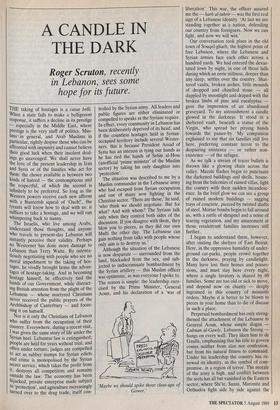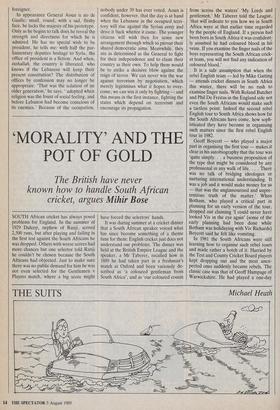A CANDLE IN THE DARK
Roger Scruton, recently
in Lebanon, sees some hope for its future.
THE taking of hostages is a cases Belli. When a state fails to make a belligerent response, it suffers a decline in its prestige especially in the Middle East, where prestige is the very stuff of politics. Mus- lims' in general, and Arab Muslims in particular, rightly despise those who can be affronted with impunity and cannot believe their good luck when their insolent deal- ings go unavenged. We shall never have the love of the present leadership in Iran and Syria or of the fanatics who act for them: the choice available is between two kinds of hatred — the contemptuous and the respectful, of which the second is infinitely to be preferred. So long as the Western powers receive each new affront with a Bunterish squeal of 'Ouch!', the tyrants will know how to deal with us: it maces to take a hostage, and we will run whimpering back to nanny.
The Israelis, who live among Arabs, understand those thoughts, and anyone who travels to present-day Lebanon will instantly perceive their validity'. Perhaps no Westerner has done more damage to Lebanon than Terry Waite. By ostenta- tiously negotiating with people who see no moral impediment to the taking of hos- tages, he vividly brought home the advan- tages of hostage-taking. And in becoming hostage himself, he effectively tied the hands of our Government, while distract- ing British attention from the plight of the Lebanese — whose martyred Christians never received the public prayers of the Archbishop of Canterbury — and focus- sing it on himself.
Nor is it only the Christians of Lebanon who suffer from the occupation of their country. Everywhere, during a recent visit, I was given the same story of life under the Syrian heel. Lebanese-law is extinguished; people are held for years without trial, and often under torture; judges are compelled to act as rubber stamps for Syrian edicts and crime is monopolised by the Syrian secret service, which takes the profit from it, destroys all competitors and remains outside the law. The economy has been hijacked, private enterprise made subject to `protection', and agriculture increasingly turned over to the drug trade, itself con-
trolled by the Syrian army. All leaders and public figures are either eliminated or compelled to speaks as the Syrians require. In effect, every community in Lebanon has been deliberately deprived of its head, and if the countless hostages held in Syrian- occupied territory include several Wester- ners, this is because President Assad of Syria has an interest in tying our hands as he has tied the hands of Selim al-Hoss (unofficial `prime minister' of the Muslim sector) by taking his only daughter into `protection'. The situation was described to me by a Muslim commander in the Lebanese army who had escaped from Syrian occupation and one of many now fighting in the Christian sector. `There are those,' he said, `who think we should negotiate. But for what? And with Whom? The Syrians talk only when they control both sides of the discussion. If you disagree with them, they blow you to pieces, as they did our own Mufti the other day. The Lebanese can gain nothing from talks with people whose only aim is to destroy us.' Although the situation of the Lebanese is now desparate — surrounded from the land, blockaded from the sea, and sub- jected to indiscriminate bombardment by the Syrian artillery — this Muslim officer was optimistic, as was everyone I spoke to. The reason is simple: the leadership exer- cised by the Prime Minister, General Aoun, and his declaration of a `war of `Maybe we should spike those close-ups of Gower.' liberation'. This war, the officer assured me the — harb al-tahrir — was the first real sign of a Lebanese identity. `At last we are standing together as a nation, defending our country from foreigners. Now we can fight, and now we will win.'
Our conversation took place in the old town of Souqel-gharb, the highest point of free Lebanon, where the Lebanese and Syrian armies face each other across a hundred yards. We had entered the devas- tated town by night, in one of those lulls during which an eerie stillness, deeper than any sleep, settles over the country. Shat- tered vaults, broken arches, little mounds of dropped and chiselled stone — all dappled by moonlight and draped with the broken limbs of pine and eucalyptus -- gave the impression of an abandoned graveyard. To my astonishment a candle glowed in the darkness. It stood in a sheltered vault, beneath a statue of the Virgin, who spread her pitying hands towards the passer-by. My companion explained to me that six families still live here, preferring constant terror to the despairing existence — or rather non- existence — of the refugee.
As we talk a stream of tracer bullets is thrown like a glowing chain across the valley. Muzzle flashes begin to punctuate the darkened buildings and shells, bounc- ing from the balconies of ruined villas, light the country with their sudden incandesc- ence. In the brief glow we can see a group of ruined modern buildings — sagging trays of concrete, pierced by twisted shafts of steel. Mortar bombs begin to fall around us, with a rattle of shrapnel and a noise of tearing vegetation, and my amazement at those recalcitrant families increases still further.
I began to understand them, however, after visiting the shelters of East Beirut. Here, in the oppressive humidity of under- ground car-parks, people crowd together in the darkness, praying by candlelight. Many have lost their homes and posses- sions, and must stay here every night, where a single lavatory is shared by 60 families. Some are too old or sick to move, and depend now on charity — deeply ingrained in this country of monastic orders. Maybe it is better to be blown to pieces in your home than to die of disease in such a place.
Perpetual bombardment has only streng- thened the attachment of the Lebanese to General Aoun, whose simple slogan — Lubnan al-Gawly, Lebanon the Strong hangs on every wall. They liken him to de Gaulle, emphasising that his title to govern comes neither from clan nor confession, but from his natural fitness to command. Under his leadership the country has re- newed its identity, as the symbol of com- promise, in a region of terror. The morale of the army is high, and conflict between the sects has all but vanished in the Eastern sector, where Shi'te, Sunni, Maronite and Orthodox fight side by side against the foreigner.
In appearance General Aoun is no de Gaulle; small, round, with a sad, fleshy face, he lacks the majesty of his prototype. Only as he begins to talk does he reveal the strength and directness for which he is admired. He has no special wish to be president, he tells me: with half the par- liamentary deputies hostage to Syria, the office of president is a fiction. And when, inshallah, the country is liberated, who knows if the Lebanese will keep their present constitution? The distribution of offices by confession may no longer be appropriate. 'That was the solution of an older generation,' he says, adopted when religion was the fount of social feeling, and before Lebanon had become conscious of its enemies.' Because of the occupation, nobody under 39 has ever voted. Aoun is confident, however, that the day is at hand when the Lebanese in the occupied terri- tory will rise against the Syrian army and drive it back whence it came. The younger citizens will wish then for some new arrangement through which to pursue their shared democratic aims. Meanwhile, they are as determined as the General to fight for their independence and to claim their country as their own. To help them would be to strike a decisive blow against the reign of terror. We can never win the war against terrorism by negotiation, which merely legitimises what it hopes to over- come; we can win it only by fighting — and this means in the first instance, fighting the states which depend on terrorism and encourage its propagation.



















































 Previous page
Previous page